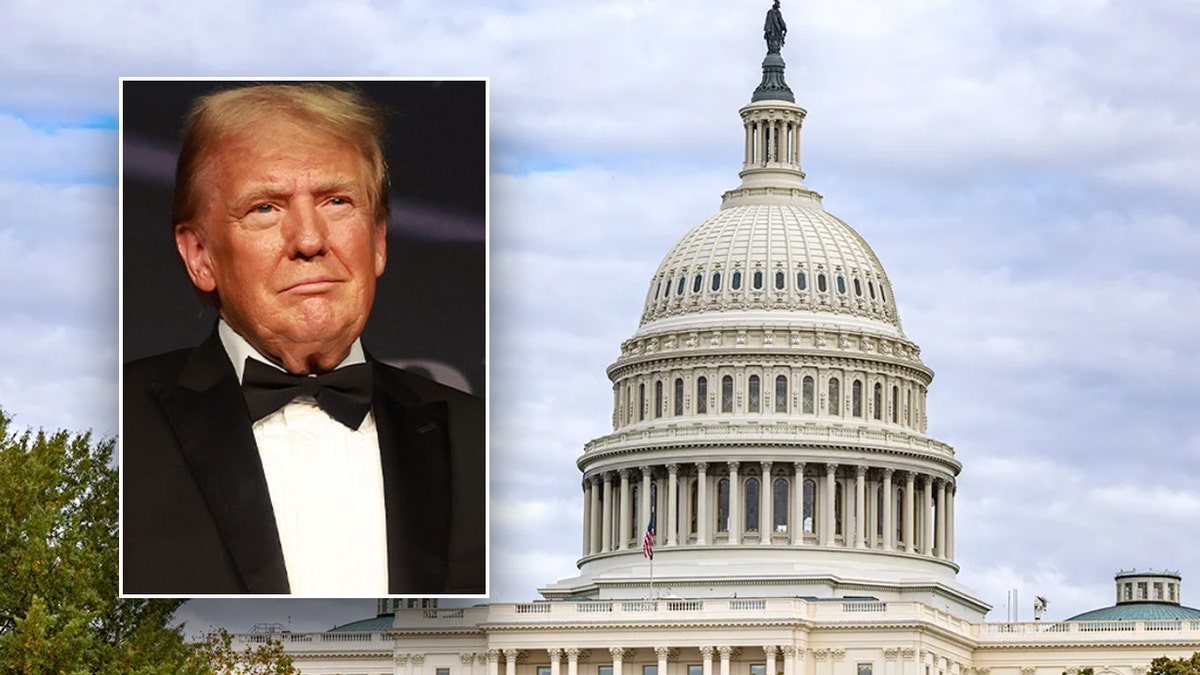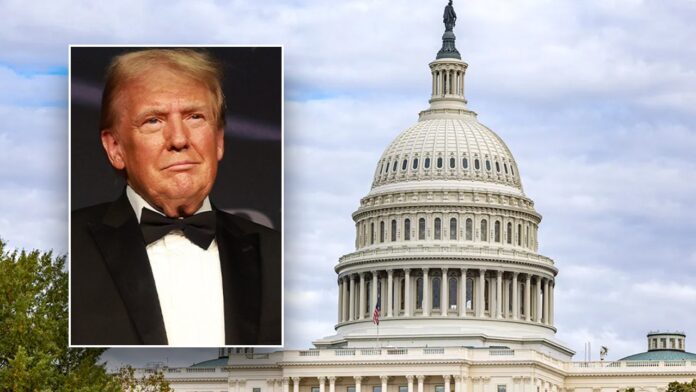First, there was House Republican Conference Chairwoman Elise Stefanik, R-N.Y.
President-elect Trump tapped her to serve as ambassador to the United Nations.
Then there was Rep. Mike Waltz, R-Fla.
The incoming President asked Waltz to become his national security adviser.
THE HITCHHIKER’S GUIDE TO POTENTIALLY RELEASING THE ETHICS COMMITTEE REPORT ON GAETZ
Then Mr. Trump selected former Rep. Matt Gaetz, R-Fla., for attorney general, and Gaetz promptly quit.
That’s quite a drain on one institution in just a few days.
Anybody else from the House?
“I know he’s already pulled a few really talented people out of the House. Hopefully, no more for a little while until special elections,” said House Majority Leader Steve Scalise, R-La.
It’s about the math.

President-elect Donald Trump and the U.S. Capitol. (Getty Images)
With Stefanik, Waltz and Gaetz on board, House Republicans likely score a majority of 221 seats to 214 for the Democrats. It’s a margin of seven. But it means the GOP can only lose three votes on any given roll call and still pass the issue at hand without needing assistance from the other side.
With Gaetz out and Stefanik and Waltz departing, that majority shrinks to 218-214. A margin of four votes. But Republicans can now only lose one vote. And there is almost never perfect attendance in the House. Absences are inevitable.
But what if there are more departures?
A senior House GOP source told Fox before the departure of Gaetz the Republican majority could lose no more than two House members to the Trump administration.
“I don’t know if the administration has a number in their head,” the source said.
THUNE WINS SECRET BALLOT TO BECOME NEW SENATE GOP LEADER, SUCCEEDING MCCONNELL
And remember, you can’t appoint a House member. You can do that in the Senate. But not the House. Governors must call special elections to fill these seats. So, in the case of Stefanik, it may take Democratic New York Gov. Kathy Hochul three to four months to call a special election.
Naturally, that presumes the seat stays in the GOP column. These are Republican seats. But there are surprises in special elections. The usual universe of voters don’t always show up.
“I would imagine Hochul, given her cynical attempt at politics, will likely try to use the full 90 days,” groused Rep. Mike Lawler, R-N.Y.
Meantime, House Speaker Mike Johnson, R-La., got on the horn to Republican Florida Gov. Ron DeSantis in hopes of calling a special election in just a few weeks for the seat left vacant by Gaetz. The hope is that the district will send a Republican successor to Gaetz to Washington just after the new year.
This is why you can possibly quash chatter about whether Republican Ohio Gov. Mike DeWine might appoint Rep. Max Miller, R-Ohio, to the Senate seat of Vice President-elect JD Vance. Under other circumstances, Rep. Byron Donalds, R-Fla., could be in play for an administration post or to even succeed Sen. Marco Rubio, R-Fla., in the Senate if he’s confirmed as secretary of state. But that scenario creates yet another House vacancy.

Rep. Matt Gaetz, R-Fla., waves on stage at the Republican National Convention at the Fiserv Forum in Milwaukee July 17. (Leon Neal/Getty Images)
“President Trump fully understands and appreciates the math here. And it’s just a numbers game,” said Johnson. “But every single vote will count, because if someone gets ill or has a car accident or a late flight on their plane, then it affects the votes on the floor. So, I think he and the administration are well attuned to that.”
Johnson added, “I don’t expect that we will have more members leaving.”
Then President-elect Trump drafted Gaetz.
House Republicans struggled at times to advance their own agenda with a similar narrow majority over the past two years. They leaned on Democrats to avoid multiple government shutdowns and to lift the debt ceiling. They failed on their first attempt to impeach Homeland Security Secretary Alejandro Mayorkas. Republicans dithered for a grand total of 27 days on two different occasions last year trying to figure out who would be speaker of the House.
Former House Speaker Kevin McCarthy, R-Calif., couldn’t become speaker at the beginning of Congress because the GOP numbers were so thin. House Republicans then struggled for more than three weeks last fall to elect a successor to McCarthy for the same reasons.
So, what is past is prologue.
RICK SCOTT GAINS NEW SENATE ENDORSEMENTS OUT OF CANDIDATE FORUM ON EVE OF LEADER ELECTION
A failure of simple parliamentary algebra could stymie the agenda of President-elect Trump.
“Between the speaker and (incoming Senate Majority Leader John) Thune, R-S.D., there’s a real understanding we’ve got to maintain these majorities,” said Rep. Marc Molinaro, R-N.Y.
Ironically, had Molinaro held his seat against Rep.-elect Josh Riley, D-N.Y., the GOP would enjoy a bigger cushion.
Trump is acutely aware of the problem in the House.
“I promised Mike that I wouldn’t be taking too many more before we start counting the votes. He said, ‘Please, could you slow down a little bit?’ I just like the people in Congress. Mike, I’m sorry. But don’t worry about it, Mike. Just relax. Just relax,” the president-elect said.
Republicans are already building potential absences and vacancies into their legislative calculus for the new year.

U.S. Speaker of the House Mike Johnson shakes hands with President-elect Trump onstage at a House Republicans Conference meeting at the Hyatt Regency on Capitol Hill Nov. 13, 2024, in Washington, D.C. (Andrew Harnik/Getty Images)
“It’ll be like a logistics chess match. When we have to do a certain vote, if we’re really at a one-seat majority and someone’s sick, there’ll be logistics involved with that,” said Rep. Blake Moore, R-Utah, vice chairman of the House Republican Conference.
But that is easier said than done. That presumes that everyone present and accounted for is on board with the issue of the day. Republicans struggled with that phenomenon on a regular basis over the past two years.
“This is a deeply divided Republican Party – unified now by their victory. But see how long that lasts,” said former House Majority Leader Steny Hoyer, D-Md. “We know there are deep philosophical and procedural differences within the Republican Party that we saw repeatedly in the last Congress.”
House Minority Leader Hakeem Jeffries, D-N.Y., told Republicans to not expect a lifeline from the minority party in the new year.
“If you believe that that’s an overwhelming mandate, then, of course, the American people will expect that you will do the basics in terms of governing,” said Jeffries.
The country is on yet another collision with the debt ceiling. The issue should ripen sometime in the first quarter of next year. Jeffries argued that if Republicans are in charge and have the support of voters, then they should “be able to avoid a catastrophic default on our nation’s debt.”
But Jeffries added a caveat about last week’s election.
“If you believe that’s an overwhelming mandate,” he said.
That’s the challenge facing House Republicans. The people spoke. Now they expect action. But the equation in the House is hard to manage on any given day. And departures for the next administration don’t massage the mathematics at all.
Source link






